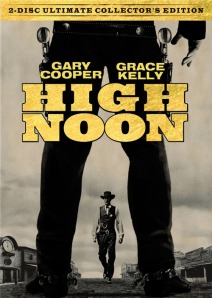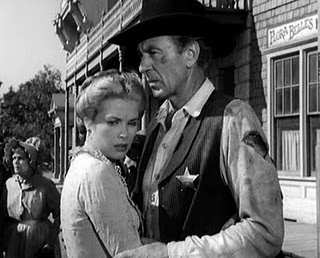 In 1952 Stanley Kramer debuted Grace Kelly in his production of High Noon which also starred the great Gary Cooper. Cooper’s career had slowed a bit until his dramatic turn as Marshal Kane.
In 1952 Stanley Kramer debuted Grace Kelly in his production of High Noon which also starred the great Gary Cooper. Cooper’s career had slowed a bit until his dramatic turn as Marshal Kane.
High Noon depicts bright Sunday morning that is interrupted by a gang of mercenaries who coming riding into town.
Instead of riding off with his new bride Amy (Kelly), Marshal Kane stays behind to defend the town until the new marshal arrives.
Kane defends a town of cowards from Frank Miller who has come back to challenge him. After outright asking for deputies in the local watering hole, Kane finds that much of the town is reluctant to help him. Even his current deputy Harvey (Lloyd Bridges) quits on him.
Ben Miller had already arrived in town, and his brother Frank, who Kane had arrested before, was scheduled to arrive in town at, you guessed it, high noon.
Bridges gives a great performance as the tortured deputy and friend of Kane. He is threatened by Kane and is angry that he didn’t fight for him to be the new marshal. Harvey’s anger finally boils over and they fight in the stables as Harvey tries to get Kane to leave.
The story comes to a climax as the whole town waits for the clock to strike 12. The director and producers of High Noon did a great job of laying on the tension with dramatic closeups of the main characters.
And then you hear the train whistle. Frank Miller departs from the train.
Amy and Helen Ramirez, who was a previous lover to Kane and Frank Miller, board the now outgoing train to safety.
Kane walks down the street to face the men alone. When Amy hears shots being fired she gets off the train just before it leaves the station. She sees a dead man lying the in street but is relieved to see it is not her husband. She ends up joining the fight, shooting one of the gang members herself. But Miller then uses her to lure Kane out in the street. Thinking quickly, she distracts Miller and Kane is able to kill him.
The embrace of the still-very-newlyweds is touching. Before climbing in the wagon to leave the town for good, Kane takes off his star and throws it in the dirt at the feet of the ungrateful townspeople who had gathered.
I was fortunate enough to also watch additional commentary on High Noon with Leonard Maltin. Maltin describes High Noon as a morality play that just happens to be a western.
For any Western genre fan this is a must. It may seem a bit slow at first, but stick with it. It only gets better as the story develops.
Leave a comment